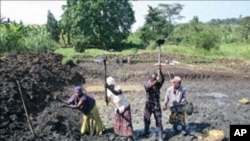Marine researchers hope that fish farming - the process of raising fish in ponds for food - can help African countries overcome chronic food shortages.
Scientists from the Athens-based Hellenic Centre for Marine Research are working on ways to improve fish farming in Europe, and now have been asked to do the same to alleviate food shortages in Africa.
The governments of Kenya and Sierra Leone approached the European Union for assistance with fisheries.
Hellenic Centre director Evangelos Papathanassiou explains this is a joint European-African project.
"In regard to African countries, I know there is initiative from the EU side, they were three meetings with high-level officials from the African countries and the EU in terms of research and innovative for food security," said Papathanassiou.
The project began this year to encourage fish farming as a way to combat over-fishing.
With decreasing fish stocks in rivers and lakes due to environmental pollution, the practice is one way for Africa to feed its population and bridge the gap between demand and supply in the market.
The Hellenic Centre has sent some researchers to Kenya’s Lake Victoria - where fish stocks have been dropping - to set up a pilot project.
Papathanassiou says Africa needs to find new ways to feed its population in case traditional sources of food are exhausted.
"You could have the food you need if the food supplies is not enough or you exhaust the fisheries from one lake. Then you shouldn't exhaust fish from one lake, you should fish as long as you can have a stable yield and then try to have aquaculture [fish farming] fish. It’s a kind of combination that probably will come through the project eventually," he said.
The U.N. Food and Agriculture Organization says 214 million people in sub-Saharan Africa currently face some type of food crisis, and that the continent is making slower progress in achieving international hunger-reduction targets than other regions.
The FAO says one in four Africans are undernourished - the highest rate among any region in the world.




